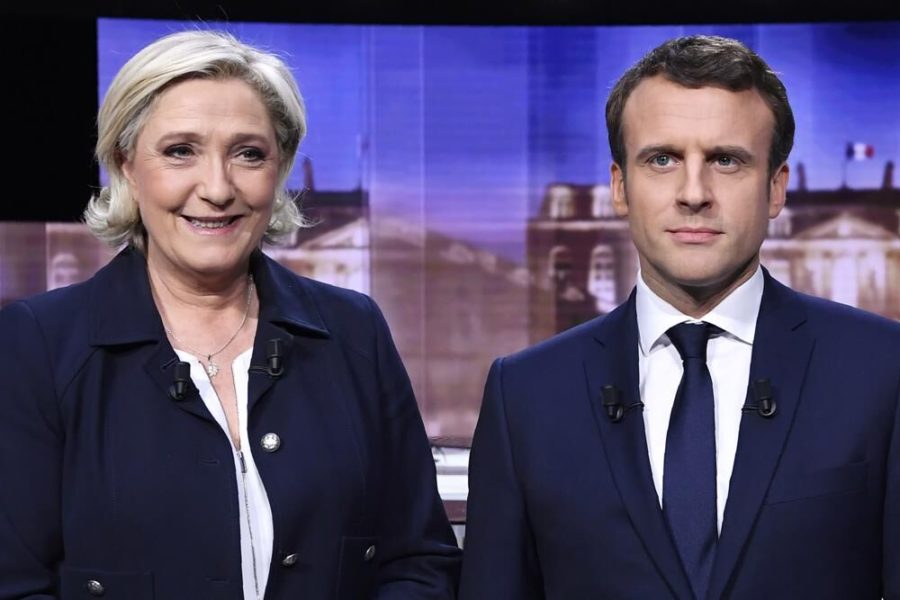France reelects liberal President Macron
Emmanuel Macron is the winner of the 2022 French presidential election.
April 24, 2022
The French population reelected liberal-centrist Emmanuel Macron in a presidential runoff election against right wing candidate Marine Le Pen on Sunday.
According to newest projections, Macron (La République en Marche) received about 59 percent of the votes, while Le Pen (Rassemblement National) was left behind with about 41 percent.
In the French electoral system, all candidates, this year 12, stand in a first round of elections where a candidate can only become president when having an absolute majority. If this is not the case, the two candidates with the most votes stand again in a runoff election.
In 2017, the two candidates in the runoff election were Macron and Le Pen. Back then, Macron defeated Le Pen after receiving 66 percent of the votes.
Since then, Macron and Le Pen have had a hard fight representing two different ideas for France’s international and domestic policies.
Scott Feinstein, assistant professor of political science, said that Le Pen has an almost ideological position that there is an evil elite in power, and she, as a representative of the virtuous population, wants to help right this wrong.
Macron’s politics, on the other hand, revolve around the idea of a world-open France with strong bridges across Europe.
Over the last years, Macron has struggled with cultivating a personality of likability, Feinstein said.
Feinstein said that Macron has tried to build a position as a European and a global leader, using the opportunity to negotiate across Europe.
“[His reelection] is an affirmation of France’s international pursuit towards European unity,” Feinstein said.
Salomé Prat, a France-born sophomore majoring in psychology, said that the biggest reason people voted for Macron had been a dislike of the alternative.
“They don’t want the [Rassemblement National] to win,” she said. “They don’t want the right side to win.”
Nina Havage, a 20-year-old living in the southeast of France, said a lot of young French people didn’t really like either candidate but wanted to make sure Le Pen lost.
“We voted more against somebody than for somebody,” Havage said.
Prat said a lot of French people are not happy with Macron’s politics regarding taxes and high prices.
Havage said many people, especially young people, have not been happy with France’s politics regarding climate change and the fact that climate change was little discussed in the election process.
This dissatisfaction regarding important political topics led to a lower voter turnout than in 2017. Prat said a lot of French people didn’t like Macron or Le Pen, and therefore didn’t vote at all.
Macron’s win makes a continuation of France’s international politics likely, Feinstein said.
While Le Pen had the goal of reforming the EU, Macron will continue his effort to democratize the EU.
With Macron staying president for five more years, he and France as a country will try to assert themselves as world leaders, Feinstein said. This attempt has the potential to strengthen NATO and help persuade countries like Sweden and Finland to join.
Macron winning also helps the relationship between France and the United States. Contrary to France’s position with Le Pen as president, he will not retreat away, Feinstein said.
“Being more connected around the world, being more connected to different countries, not only we start to imagine a world of a society of states, but we also start to act closer to one another,” Feinstein said.
This includes the opportunity to have agreements and, more importantly, avoid misconceptions and misinterpretations, Feinstein said.
Shortly after the announcement of the first election results, Le Pen said that she would start to concentrate on the legislative elections for her party, which will take place in June.
In his victory speech, Macron not only addressed his own supporters, but also people that voted for Marine Le Pen.
“I understand their disagreement and the anger that led them to vote for that project, and we need to answer them as well,” he said. “That will be my responsibility and the responsibility of those around me.”

















